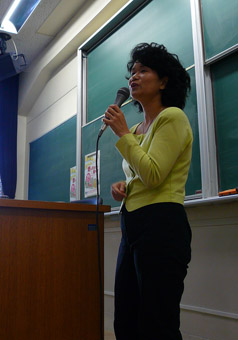Shuhei OTSUBO
Undergraduate student, ICU
【The article below is the same as the article that appears in the ninth issue of the CGS Newsletter.】
 On October 5th, 2007, CGS and the ICU Placement Office co-hosted a seminar entitled “Why Suffer from Job Burnout? Tips for Your Future Career.” The speaker, Ms. Naoko Takayama, discussed the psychological pressures that people face in the workplace and offered advice from a counseler’s viewpoint on how to avoid these problems, based on case examples of her own clients. In order to make the topic accessible for students about to embark on their job hunting and other people interested in the possible problems of the workplace, she used detailed handouts and other interesting devices such as personal checklists to enable participants to identify their own individual issues.
On October 5th, 2007, CGS and the ICU Placement Office co-hosted a seminar entitled “Why Suffer from Job Burnout? Tips for Your Future Career.” The speaker, Ms. Naoko Takayama, discussed the psychological pressures that people face in the workplace and offered advice from a counseler’s viewpoint on how to avoid these problems, based on case examples of her own clients. In order to make the topic accessible for students about to embark on their job hunting and other people interested in the possible problems of the workplace, she used detailed handouts and other interesting devices such as personal checklists to enable participants to identify their own individual issues.
In discussing the causes of the burnout syndrome, Takayama stressed that “thy greatest enemy is thyself.” In other words, people can suffer from an extreme loss of self-esteem due to repeated degradation (being yelled at by one’s boss, for example) and consequently their minds become exhausted. She suggested that, when you are upset, it is important to avoid becoming too self-conscious. However, the issues pertaining to self perception cannot easily be resolved by the individual. Thus, she presented two communication skills ? 1) attentive listening, which can be applied to people who are in a burned-out state, and 2) effective expression and transmission of your thoughts, ideas and opinions. The former skill enables you to respect and empathize with other peoples’ values, while the latter enables you to present your will or ideas as an alternative, without imposing them upon others.
For example, it is unlikely that those people approaching burnout will be able to recognize their extreme thought processes and resolve their problems. If others could implement the communication skills suggested in the lecture and give the sufferers a helping hand, they will be more likely to recognize their biased perception of themselves. The efforts of others in utilizing the appropriate communication skills may indeed be more effective in preventing the unnecessary lowering of self-esteem which leads to the burnout syndrome, rather than an individual try to improve their own self perception.
At first glance, Ms. Takayama’s suggestions do not seem so easy to apply in reality. Since most of us are bound by our own personal values or presupposed common sense, it is difficult to avoid imposing them upon others in our efforts to help them. In fact, it is impossible to completely avoid the discrepancy in cognition between ourselves and others during conversation.
Yet, this is precisely why Takayama’s communication techniques have such significance. Both skills attempt to resolve problems whilst recognizing the differences between our own subjectivity and that of others and maintaining a mutual respect for individual beliefs. In Takayama’s words, we must “separate the individual from the problem.” This means that we should not simply judge that an individual has a problem, but rather, think about how to resolve the problem that she/he has. As long as we keep this in mind while listening to the problems of someone approaching burnout, it will definitely help her/him in some way or another. This seminar taught me that when listening to other people’s problems in general, we must always remember that each person is the expert on her/his life.